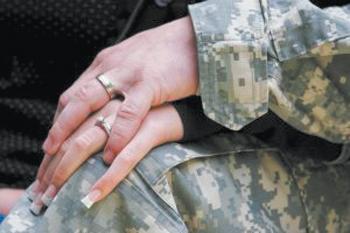 Military spouses often have to maintain disrupted households, raise children, work outside the home and take on duties their partners normally tend to.
Military spouses often have to maintain disrupted households, raise children, work outside the home and take on duties their partners normally tend to.
Military family advocates say some disturbing trends related to deployments have emerged in a recent survey. Only 19 percent of spouses indicated they had excellent or very good military support during their service member’s most recent deployment. That’s lower than what spouses reported in 2015. Deployments have become commonplace during nearly 18 years of warfare in Afghanistan.
Twenty-three percent said readjustments have been difficult for their service members upon return from deployment, also higher than 2015.
“What that tells me is that something’s going on in a bad way with the level of support offered families during deployments,” said Joyce Raezer, executive director of the National Military Family Association. “I think families get more isolated,” she added.
The survey, a scientific random sampling of spouses, was conducted by the Defense Department across the U.S. military establishment. The results can be generalized to the entire spousal population. It explored topics ranging from spouse employment and childcare to finances. Of the 45,077 active-duty spouses selected for the survey, 9,813 completed it, or 17 percent.
Vice President Mike Pence’s wife, Karen Pence, is using her position to help wives overcome the challenges that come with being wed to activeduty servicemen. Karen sees spousal happiness as key to military readiness. Unhappy spouses lead to unhappy service members who eventually will quit. She wants to launch a campaign to elevate, encourage and thank military spouses.
Karen’s effort is reminiscent of Joining Forces, an initiative that promoted military families. It was led by former first lady Michelle Obama and Jill Biden, the wife of former Vice President Joe Biden. Karen said Joining Forces made a lot of progress for military spouses in making the states aware of uncoordinated licensing issues. It prompted legislative changes.
But a recent study by the University of Minnesota found that, while state laws may have been updated, information provided by occupational boards is sometimes lacking. The study found that some employment applications omitted questions about military status, and some websites had no information about transfer opportunities for military spouses.
The survey also found that loneliness was a problem for military wives during their husbands’ most recent deployment. The increasing sense of loneliness and lack of connectedness is a finding echoed in results from the 2018 Blue Star Families’ Military Family Lifestyle Survey. A.T. Johnston, deputy assistant secretary of defense for family policy, said it struck her that nearly 50 percent of the spouses of soldiers holding the paygrades E1 to E4 soldiers reported loneliness as a common problem during deployments.
“Helping our newest service members learn how to connect is one of the best things we can do to help with resiliency,” she said.

 How to resolve AdBlock issue?
How to resolve AdBlock issue? 








